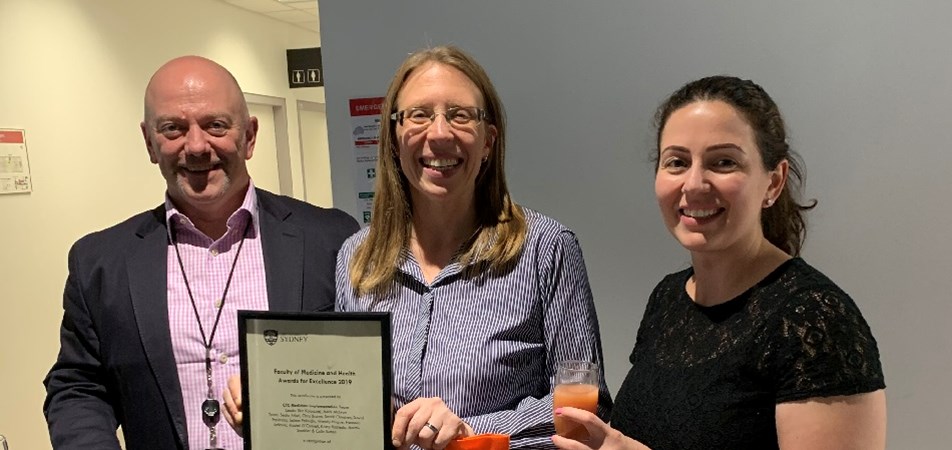To recover your password please fill in your email address
Please fill in below form to create an account with us

06/12/19
CTC’s Medidata Implementation team and our Health Economics head, A/Prof Rachael Morton, received two coveted awards from the University for 2019, highlighting our leading efforts in data collection and analysis, and in the supervision of Higher Degree Research (HDR) students.
Medidata team streamlines trial cycle
CTC’s Medidata Implementation team were recently awarded by the Faculty of Health and Medicine for their ‘outstanding contribution to research excellence’.
The new Medidata system allows for the faster and more efficient development and implementation of trials, easier data management, and more standard data sets for easier analysis. It also allows CTC to conduct trials with more complex protocol designs, such as adaptive studies, which are on the rise globally in the trial space.
Six trials are currently using the Medidata system. Four more trials are about to start using it, and there are at least ten trials in the pipeline that are expected to come on board over the next six to nine months.
Work by the team began in 2016, with the Medidata Implementation team reviewing existing systems with the goal of streamlining processes in the trial life cycle. In addition to the new Medidata system, a set of generic templates and procedures were established that can be used for many new trials with little need to customise.
Next, the team plans to further refine and streamline processes, and incorporate other modules for operations and administration from the Medidata platform.
A/Prof Morton awarded Supervisor of the Year
In another coup for CTC, A/Prof Rachael Morton was awarded Supervisor of the Year for 2019 in the University’s Sydney Medical School, which comprises over 1,600 academics. Students voted for Rachael, with the award delivered by the Sydney University Postgraduate Representative Association (SUPRA).
Rachael currently supervises five PhD candidates. Their topics are:
‘I always prioritise my PhD candidates and ensure we have regular face to face meetings,’ Rachael said. ‘I see my role as providing constructive feedback, a sounding board for ideas and deep thinking, and offering opportunities to present their work to different audiences.’
For those students looking to undertake quality research, Rachael advised they have a good research question that will impact clinical care or health policy, and that they spend time mastering new quantitative or qualitative research methods.
A/Prof Morton has also just been awarded the Mid-Career Investigator Award from Health Services Research Association of Australia and New Zealand (HSRAANZ). The award acknowledges Rachael’s formidable research output (140 peer–reviewed publications) and her influence on three key changes in clinical practice and healthcare policy: the treatment of end-stage kidney disease, screening migrants for infectious diseases in the EU, and the harms caused by diagnostic imaging in cancer patients.